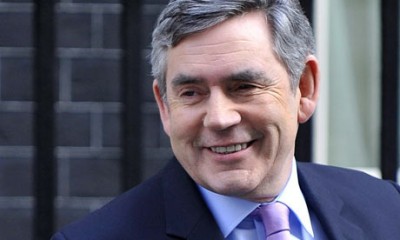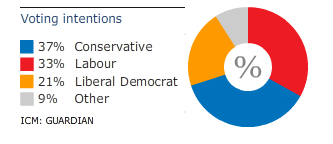
I wish I could take credit for the headline, but credit must go to Anne Perkins of The Guardian-UK. Earlier today, Labour leader Gordon Brown tendered his resignation to the Queen after it looks like the Liberal Democrats and the Conservatives are close to striking a deal. This would hand the Prime Minister spot to Tory leader, David Cameron, in a coalition that will have a majority of the seats in Parliament. Six months ago, Clegg had not many good things to say about the Tories::
“If progressives are to avoid being marginalised by an ideologically-barren Conservative party, bereft of any discernible convictions other than a sense of entitlement that is now their turn to govern, then the progressive forces in British politics must regroup under a new banner.”
I’m curious what this coalition will look like, given how a Lib-Con coalition will make for some strange bedfellows. Indeed, Anne is right, as the Conservatives won’t just be holding hands with the Lib Dems, but sharing power and cabinet seats.
I’m not against coalitions or parties changing their stances on issues, as I’ve blogged about earlier today on rhizomicon. Where things get dicey is keeping the coalition together and making sure the voters in the MP’s constituencies are on-board. Also, Perkins points out that such coalitions are rare and usually occur under dire circumstances::
“In Westminster history, coalition has always been about demonstrating unity in crisis, leading by example in a response to war or national disaster. Times are hard; the economic situation is bleak. But we are not living in a time of national catastrophe. At least not yet.”
On the web, pundits, journalists, and commentors on news sites are shouting “sellout” on the part of Nick Clegg and David Cameron. While the specifics aren’t out, the rumour mill is that the Lib Dems made concessions on::
- Immigration amnesty
- Defence policy & Trident
- Closer ties to Europe
Will these be dealbreakers to Lib-Dem MPs, who still need to ratify the deal, and those who supported them? The Lib-Dems were a platform of change and while a coalition implies concessions on both sides, will a Lib-Con coalition leave a bad taste in the mouths of many?
David Cameron doesn’t need the support of his party, but I question how hard-line conservatives will perceive this power sharing arrangement.
Song:: Selecter-‘Selling Out Your Future’
Twitterversion:: UK Lib-Con coalition imminent, but as Ann Perkins says “not a marriage of convenience but actual sex” #ThickCulture @Prof_K


 If no party gets a majority, the result will be a hung parliament and parties working in coalitions, which some say makes investors uneasy and can make enacting economy-fixing policy difficult. This
If no party gets a majority, the result will be a hung parliament and parties working in coalitions, which some say makes investors uneasy and can make enacting economy-fixing policy difficult. This